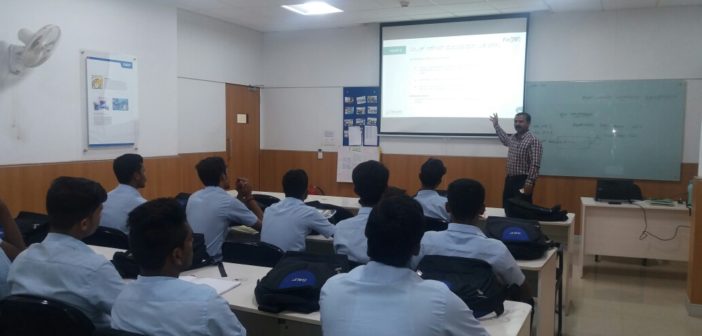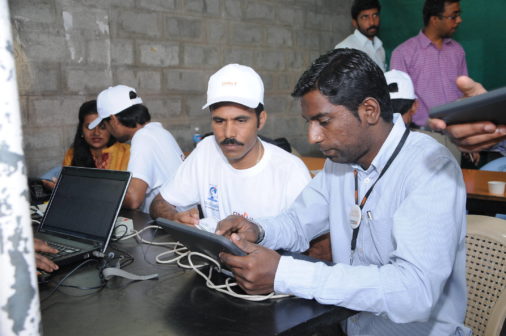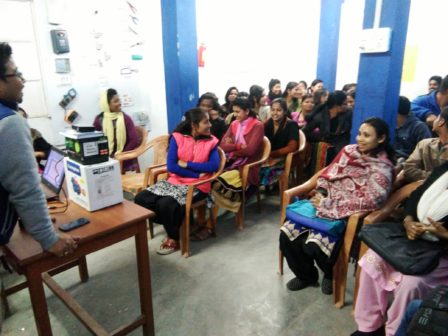To skill a population of our size, we need multiple channels. We have currently embarked on many programs, mostly at the level of basic skilling and these are being offered through face-to-face classroom learning. The training centers are following conventional methods of teaching the students. This Skill Talk by A M Thimmiya, President, LabourNet, unravels the scope of complementing traditional forms of training with technology enabled interventions. A M Thimmiya has been in the training, education and talent development industry for more than two decades and his insights on digital learning are highly valuable for all the stakeholders in the skilling space.
Role of technology-enabled blended learning
 LabourNet is focused on bridging the gap between the informal and formal sectors by enabling livelihoods through 3 EEE, i.e., Education, Employment and Entrepreneurship. Skilling is the common thread that binds all the three and use of technology will ensure that we scale up fast and reach maximum numbers.
LabourNet is focused on bridging the gap between the informal and formal sectors by enabling livelihoods through 3 EEE, i.e., Education, Employment and Entrepreneurship. Skilling is the common thread that binds all the three and use of technology will ensure that we scale up fast and reach maximum numbers.
Using blended technology will have a major positive impact in the vocational space. Organizations have successfully used and implemented blended learning in Automobile, White Goods, Health Care, Retail, Life Skills and others have used blended learning to train, upgrade skills for their work floor technicians and truck drivers. Technology gives you to advantage of learning through games, simulations and other learning components. It also helps in tracking student progress through continuous assessment / understanding of each learning object. Also, with mobility being all pervasive, the larger aim is to enable learning anywhere and any time and with all available methods.
 Capacity building through technology-enabled training
Capacity building through technology-enabled training
As you are aware, there’s a tremendous dearth of skilled workforce in the informal sector. The peculiarity of this sector is that even though it generates 85% of employment, there aren’t any measures taken to ensure that the workforce is updated with latest knowledge and skills. In most cases, they continue to work with old practices with lower levels of productivity and quality. If we don’t address this issue urgently, this vibrant sector will not be able to measure up to international standards and global efficiency levels.
At the same time, we need to convince the SME and MSME segment about the importance of training and the value delivered by trained workforce. Most importantly, how do we tell them that training is not a ‘cost’ but an ‘investment’. Since, the players in this segment are constrained by time and budget, technology can solve most of the issues.
Let’s look at sectors like Construction, Automotive (servicing and maintenance) and Apparel. In all these sectors, there’s good scope for employment and entrepreneurship. However, this they are mostly small and medium players there may not be much awareness about the need for skilling the unskilled and semiskilled or upskilling. For the construction workforce, blended learning can be of great help since they cannot leave the work site to attend classroom training. Right amount of classroom training can be blended with e-learning or mobile learning (that can be accessed through tablets and similar devices). While the face to face sessions can impart theoretical knowledge, e-learning modules can take care of practical training through demos, simulations and games. These modules can be accessed from the work-site at the convenience of the worker.
Similarly, the auto mechanic training or training in tailoring skills can have a technology enabled component that provides the advantage of accessing learning anytime-anywhere. And, another aspect of e-learning is that the content can be streamlined for quality and consistency by giving the learner flexible options and multiple entry and exit points.
Technology goes where the trainers cannot!
 It is a well-known fact that we are running short of qualified and experienced trainers. Most skilling initiatives are affected by the dearth of trainers who have had industry exposure. How do we increase the number of trainers in a short time? It is quite a challenge to produce so many trainers in vocational space that demands a different kind of orientation to train the dropouts or the underprivileged. So, there’s a social element to making training aspirational and popular.
It is a well-known fact that we are running short of qualified and experienced trainers. Most skilling initiatives are affected by the dearth of trainers who have had industry exposure. How do we increase the number of trainers in a short time? It is quite a challenge to produce so many trainers in vocational space that demands a different kind of orientation to train the dropouts or the underprivileged. So, there’s a social element to making training aspirational and popular.
When we have reach the length and breadth of India and penetrate really deep, we don’t find many trainers who are willing to relocate, travel or take up challenging assignments. Now imagine, if we are able to establish a network of training centers and equip them with IT systems that can beam virtual classes. Or, give them access to high quality training content in a recorded version.
Need for blended learning and flexible training delivery
 Today, access to skill based training is limited due to classroom based delivery mechanisms. The goal of Skill India mission is to skill millions of youth, by facilitating placement and promoting entrepreneurship. We need to strive for the right blend to expand our outreach. In fact, to some extent, learning from gadgets or any digital form arouses curiosity in the subject and this may also help in creating and sustaining interest in the subject matter. Moreover, since the youth segment is already inclined towards mobile devices, it would be really worthwhile to tap the potential of digital devices in delivering training. This will also add a bit of playfulness and a flavour of gaming, if the content is designed creatively and innovatively in many industry sectors. There’s great scope and untapped potential; if this is done strategically, blended learning could soon become the preferred mode of skilling across India!
Today, access to skill based training is limited due to classroom based delivery mechanisms. The goal of Skill India mission is to skill millions of youth, by facilitating placement and promoting entrepreneurship. We need to strive for the right blend to expand our outreach. In fact, to some extent, learning from gadgets or any digital form arouses curiosity in the subject and this may also help in creating and sustaining interest in the subject matter. Moreover, since the youth segment is already inclined towards mobile devices, it would be really worthwhile to tap the potential of digital devices in delivering training. This will also add a bit of playfulness and a flavour of gaming, if the content is designed creatively and innovatively in many industry sectors. There’s great scope and untapped potential; if this is done strategically, blended learning could soon become the preferred mode of skilling across India!
Advantages of Blended Learning in skill development
Blended learning actually enhances the training of the faculty instead of replacing him/her. The fear can be removed only by educating the training organizations on how technology will supplement training. The cost can be worked out by reusing media/content while planning and development.
Blended learning can help in standardization of content and training delivery. In case of trainer shortage the training can be run with help of facilitator. Mobile apps are fast replacing computer based learning in the vocational space. It has leveraged the power of the ubiquitous device to deliver anytime, anywhere technical training. And, it comes at an affordable cost!
Skill development going the MOOC way!
India, as a country, needs a little more time to be ready for MOOC based skill training. The digital penetration needs to improve a lot more before embarking in this area. The e-learning modules can be run in training center labs / corporate skill centers. Government along with private partners should focus on developing digital usage among the rural sectors. Also MOOCs largely work on the model of self learning but for this the way India learns has to change. At best MOOCs can be supplemental and not the only way of acquiring skills.












